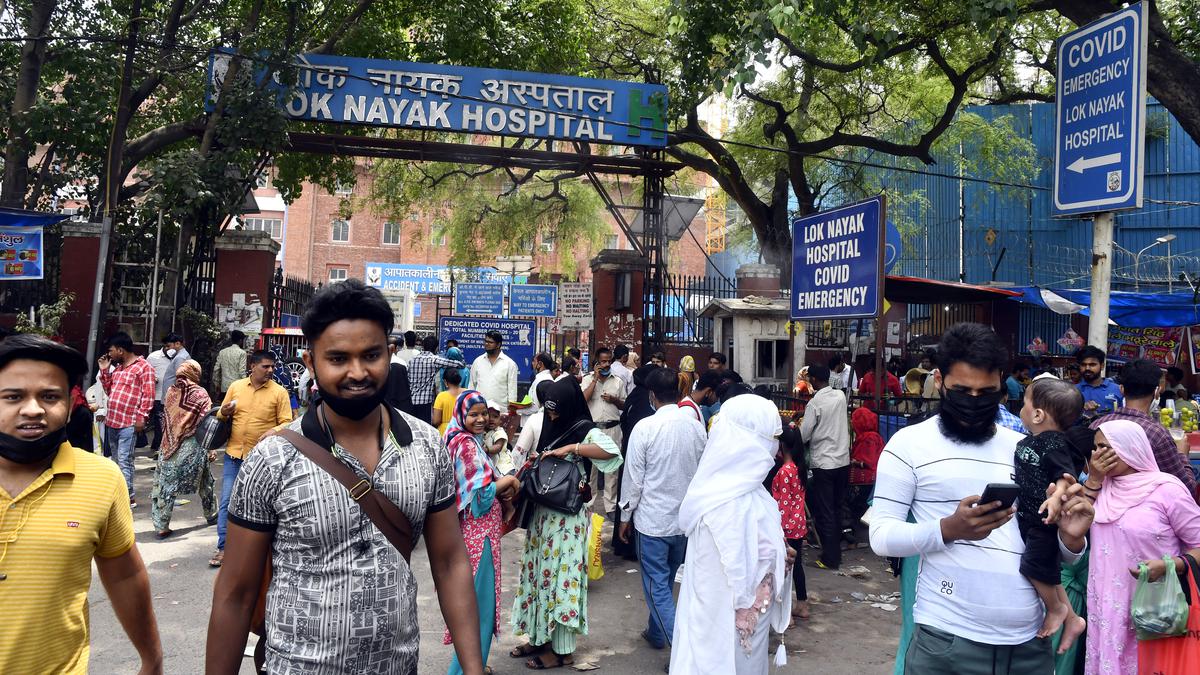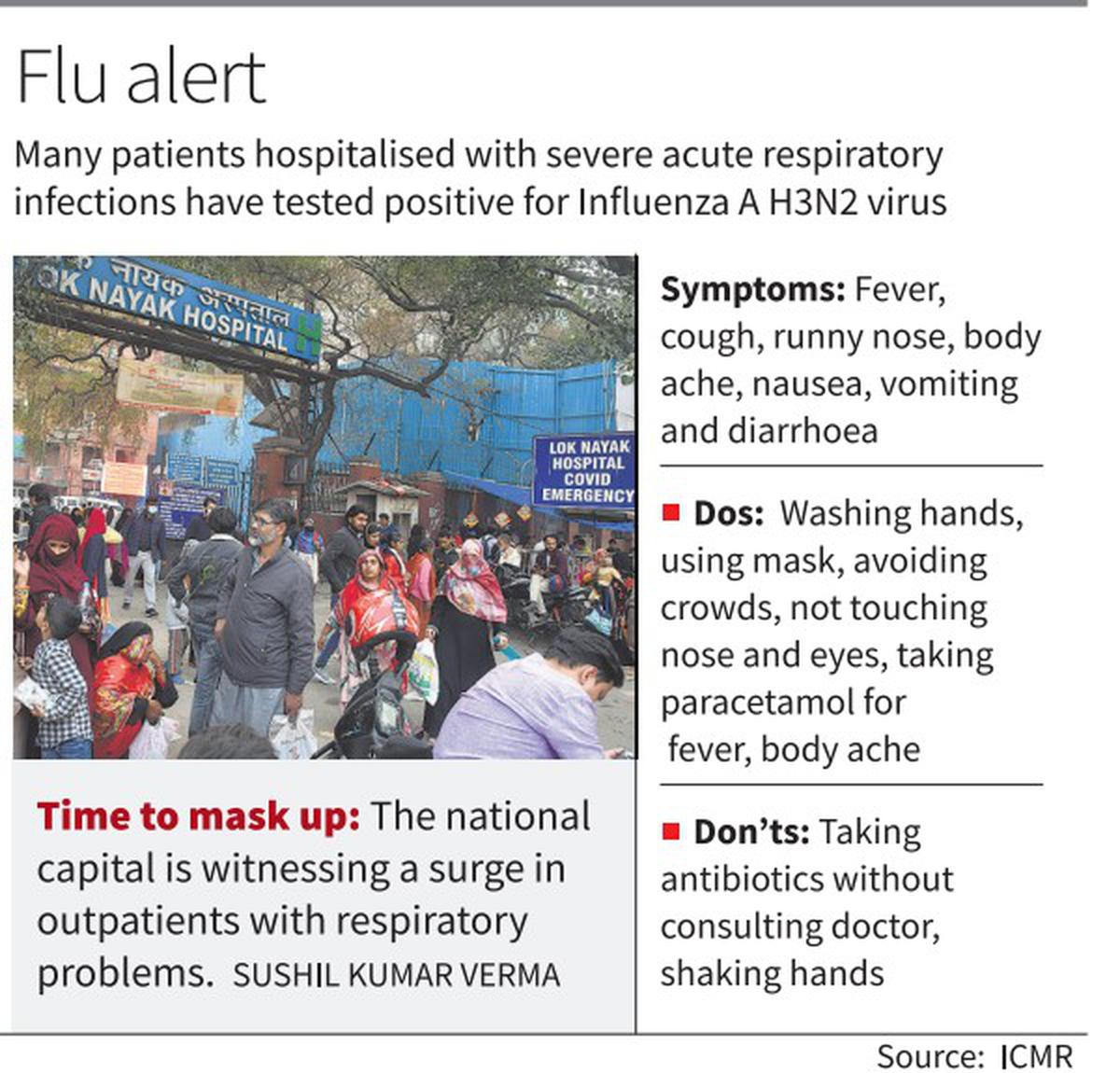Rising cases of cough and fever linked to Influenza subtype A H3N2: ICMR
In recent news, the Indian Council of Medical Research (ICMR) has reported a rise in cases of cough and fever linked to Influenza subtype A H3N2 in India. This is a cause for concern, as the H3N2 subtype is known to cause more severe illness and has been associated with higher mortality rates compared to other influenza subtypes.
Influenza is a contagious respiratory illness caused by influenza viruses. These viruses can spread through the air when an infected person talks, coughs or sneezes, or by touching a surface contaminated with the virus and then touching one's own mouth, nose or eyes. Symptoms of influenza include fever, cough, sore throat, runny or stuffy nose, body aches, headache, chills, and fatigue. Influenza can lead to complications such as pneumonia, bronchitis, and sinus and ear infections, and can be particularly dangerous for people with weakened immune systems, older adults, and young children.
The H3N2 subtype of influenza A has been circulating globally for many years and has caused severe outbreaks in the past. Influenza viruses constantly evolve, and the strains that circulate each year can vary. The flu vaccine is designed to protect against the strains of influenza that are predicted to circulate in a given season. It is important to get vaccinated against influenza each year, especially for people at higher risk of severe illness, such as older adults, young children, and people with chronic medical conditions.
To prevent the spread of influenza, it is important to practice good hygiene habits such as washing your hands frequently with soap and water, covering your mouth and nose with a tissue when coughing or sneezing, avoiding close contact with sick people, and staying home if you are sick. If you have symptoms of influenza, seek medical attention promptly, especially if you are at higher risk of severe illness or if your symptoms are severe.
In addition to the preventative measures mentioned above, it is also important to take steps to boost your immune system to help fight off infections like influenza. This can include getting enough sleep, eating a healthy and balanced diet, staying hydrated, and exercising regularly. Additionally, avoiding smoking and excessive alcohol consumption can also help to strengthen your immune system.
It is also important to note that while influenza vaccines are the best way to prevent influenza, they are not 100% effective. In some cases, vaccinated individuals may still contract the flu, but the severity of the illness is often reduced. It is still important to practice good hygiene habits and seek medical attention if you have symptoms of influenza, even if you have been vaccinated.
It is recommended that individuals who are at higher risk of severe illness from influenza, such as older adults, young children, pregnant women, and people with chronic medical conditions, get vaccinated as soon as possible. The flu vaccine is widely available in India and can be obtained at hospitals, clinics, and pharmacies.
In conclusion, the rising cases of cough and fever linked to Influenza subtype A H3N2 in India should be taken seriously. Practicing good hygiene habits, getting vaccinated, boosting your immune system, and seeking medical attention promptly if you have symptoms can all help to prevent the spread of the virus and reduce the severity of illness. It is important to stay informed and follow the recommendations of public health officials to protect yourself and your community from the flu.
Influenza can also be easily confused with other respiratory illnesses, such as the common cold or COVID-19, which can have similar symptoms. It is important to consult a healthcare professional if you experience symptoms, as they can help to determine the cause and provide appropriate treatment.
If you are diagnosed with influenza, your healthcare provider may prescribe antiviral medication, which can help to reduce the severity and duration of symptoms and prevent complications. It is important to take antiviral medication as prescribed and complete the full course, even if symptoms improve.
In addition to individual measures, the government can also take steps to prevent and control the spread of influenza, such as promoting vaccination campaigns, monitoring and reporting cases, and implementing measures to limit the spread of infection in public settings.
Finally, it is important to remember that influenza is a preventable illness, and taking steps to protect yourself and others can help to reduce the impact of the disease. By staying informed, practicing good hygiene habits, getting vaccinated, and seeking medical attention if needed, we can all play a role in preventing the spread of influenza and keeping our communities healthy.
It is important to note that influenza can have a significant impact on public health and the economy. In addition to causing illness and death, influenza can lead to increased healthcare costs, decreased productivity, and economic losses due to missed work and school. Influenza outbreaks can also place a strain on healthcare systems and resources.
Therefore, it is important for individuals and communities to take proactive measures to prevent and control the spread of influenza. This can include promoting vaccination campaigns, encouraging good hygiene habits, implementing policies to reduce the spread of infection in public settings, and increasing public awareness and education about influenza.
In conclusion, the rising cases of cough and fever linked to Influenza subtype A H3N2 in India highlights the importance of taking proactive measures to prevent and control the spread of influenza. By staying informed, practicing good hygiene habits, getting vaccinated, and seeking medical attention if needed, we can all play a role in protecting ourselves and our communities from the potentially serious consequences of influenza.


Comments
Post a Comment